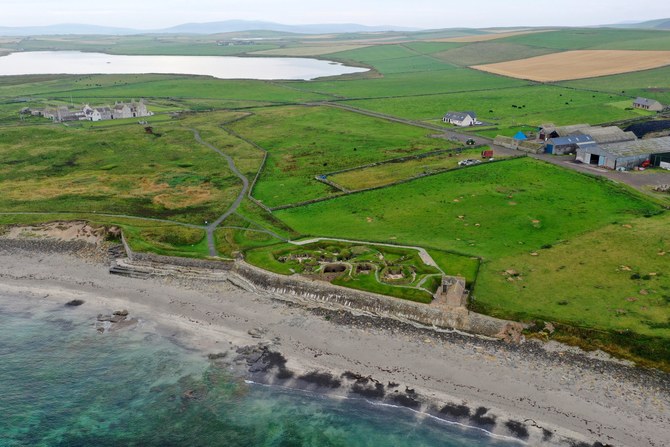Mohamed Chebaro
Midsummer nights are not yet upon us, but that does not mean some parts of the UK cannot dream. The population of a few remote islands in the far north of the country could soon have the chance to vote on whether they want to rejoin Norway, as they are becoming increasingly fed up with being part of the UK.
It seems that the appetite for independence is hitting Britain from all sides. Since the UK voted by a slim majority seven years ago to leave the EU and regain its lost sovereignty, Scotland has been arguing that it has the right to repeat its 2014 referendum that saw its people opt to stay in the union. Now, a fresh independence row is brewing within Scotland itself and, if successful, it could spark an unexpected new alliance for the residents of the remote Orkney Islands. The Orkney Islands is an archipelago located about 16 km off the north coast of Scotland. It is made up of 70 islands, with a total population of 22,000. The Orkney Islands Council’s search for “alternative methods of governance” is maybe an exercise born of desperation as a result of central government’s failures, which are being felt across the UK as a result of the ruling Conservative Party’s 13 years of harsh austerity and the lack of leadership shown by the four successive right-leaning Conservative prime ministers since 2019 to meet the aspirations of ordinary people everywhere.
A row over funding for new ferries between the islands and Scotland has brought Orkney’s situation to a head and could prove to be the straw that broke the camel’s back. Orkney is seeking £100 million ($127 million) in funding to try and replace the fleet of aging boats that carry goods and people to and from the Scottish mainland. Council leader James Stockan said the council had proposed a motion for the members to “explore options for alternative models of governance that provide greater fiscal security, and economic opportunity.” Among the options, as well as rejoining Norway, are other British arrangements, like becoming a crown dependency, the system of government at work on Jersey and Guernsey in the Channel Islands, or a model like the Faroe Islands, a self-governing part of Denmark.
This North Sea archipelago was controlled by Norway and Denmark until 1472, when it was handed over to Scotland along with the Shetland Islands as part of the dowry for a dynastic marriage between the Scandinavian king’s daughter and Scotland’s King James III. London’s defense – “together we are stronger” – does not stand anymore, as the people and country have been, over the past three years, counting the cost of the Brexit divorce deal that was not properly thought through by the political leadership of the Conservative Party in London, as well as, to a lesser extent, the other national political parties. The broken promises of Brexit and the problems it has created multiply every single day and the people of Orkney are no different to those in the rest of the UK. They feel that Brexiters, for pure Conservative Party vanity, have stolen their future and devastated the country’s economy. During the referendum campaign, we were told the British would be £350 million a week richer from no longer having to pay for EU membership. That was the lie that drove millions to vote for Brexit. Later, those people woke up to find that they were actually thousands of pounds poorer. Now, one in five small exporters are unable to trade with the EU and Brexit has shrunk the UK’s economic output by about 4 percent, reducing tax revenues by £40 billion a year. That means there is £40 billion less for the government to spend on doctors, nurses, teachers, police and other services, such as replacing Orkney’s ferries.
Orkney’s historic Nordic connections give it options, since its leaders have complained of neglect by both London and Edinburgh, and the council aims to see what alternatives are available. Since the late 1970s, large volumes of Britain’s North Sea oil have been processed on Orkney, but the islands have not seen sufficient benefits. It is hoped that, with a change of rules and governance, the islands could capitalize on new opportunities from offshore wind farms, as the harsh climate, which has always been seen as a handicap for the islanders, stands to become a commodity used to generate green power. Stockan was not clear how a return to control by Norway, 400 km across the North Sea, would work or how it could solve the problems of the islands and their inhabitants. And Norway is unlikely to interfere in what it considers a domestic and constitutional British matter.
Opening up discussions based on a 500-year-old marriage dowry is a long shot. But what is interesting to see is how ill-thought-out the UK’s divorce from the EU was, particularly as it is a country that is made up of many nations. With Scotland rejecting the chance to end its 300-year-old union with England in a referendum in 2014, Orkney is now feeling emboldened to try to strengthen its autonomy, especially as the UK central government has been showing weaker leadership and weaker control. However, it looks to me like no more than a midsummer night’s dream.







